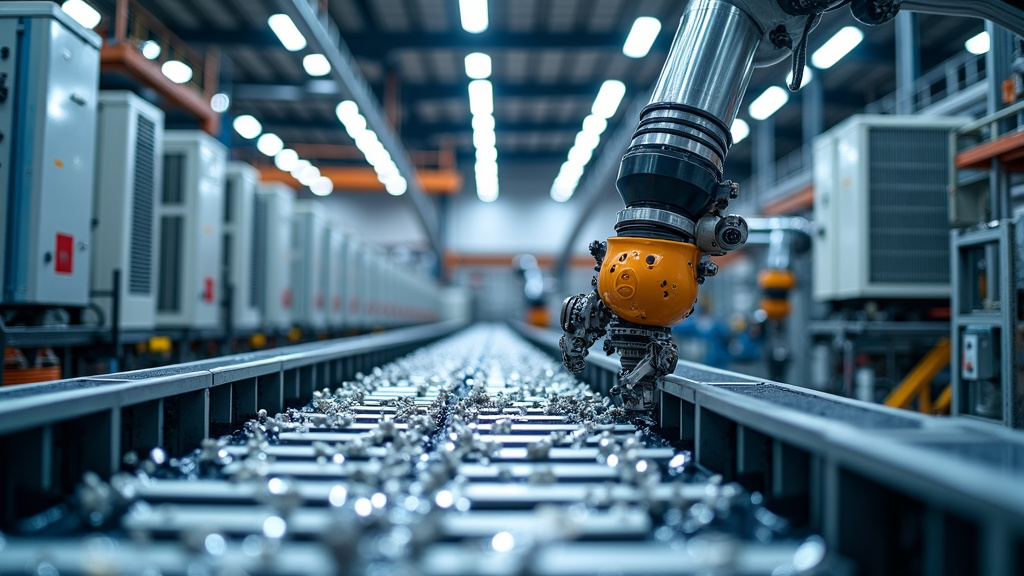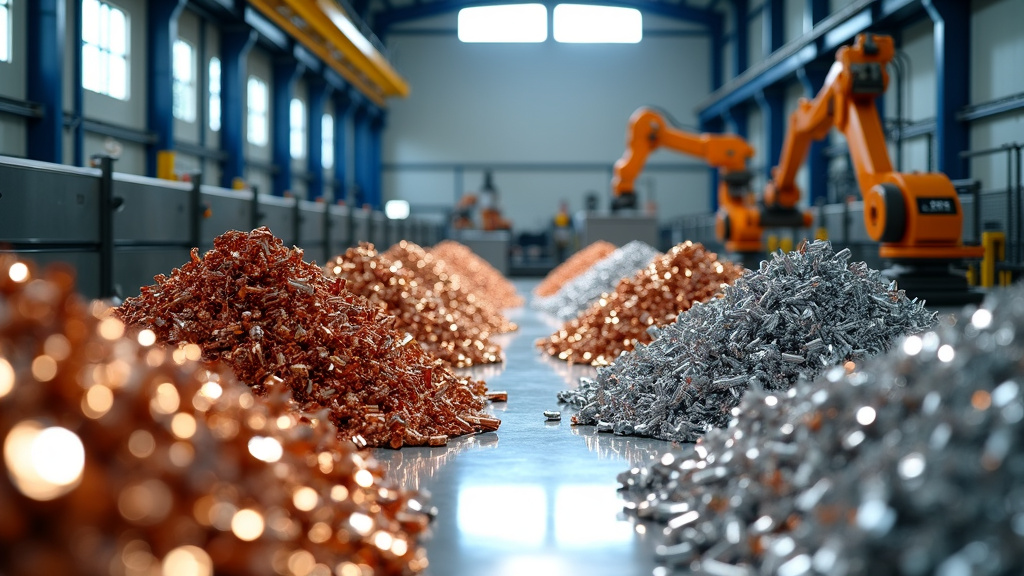5901 Botham Jean Blvd, Dallas, TX 75215
The Importance and Benefits of Rare Earth Metal Recycling
February 4, 2025Did you know that extracting just one ton of rare earth elements can produce up to 2,000 tons of toxic waste? This fact highlights the urgent need for sustainable alternatives in our technology-driven world.
Recycling rare earth metals is not just a feel-good initiative; it’s becoming an economic and environmental necessity. Mining these elements is like using a sledgehammer to crack a nut—costly, energy-intensive, and environmentally damaging. By recycling, we can keep these valuable resources in circulation while significantly reducing the need for destructive mining practices.
Moreover, recycling rare earth metals isn’t just beneficial for the planet—it can be advantageous for businesses too. Companies are recognizing the financial benefits of recycling, with tax incentives adding appeal. It’s a situation where environmentally friendly practices can also be financially rewarding.
Enter Okon Recycling, a company not content with the status quo. They are advancing with innovative recycling technologies that could transform how we manage these valuable materials. Their cutting-edge methods bring a fresh perspective to an industry that has long been stagnant.
As we consider rare earth metal recycling, we’ll explore the importance, opportunities, and groundbreaking innovations reshaping this crucial industry.
The Importance of Recycling Large-Scale Materials

Imagine a world where massive industrial cooling systems and bulky air conditioning units don’t end up in landfills, but instead find new life through innovative recycling processes. This reality is being shaped by companies like Okon Recycling, who are tackling the unique challenges posed by large-scale materials head-on.
The sheer size and complexity of these industrial behemoths make them notoriously difficult to recycle through conventional means. A single commercial HVAC system, for instance, can be a labyrinth of metals, plastics, and hazardous refrigerants. It’s not something you can simply toss into your curbside recycling bin.
Advanced recycling techniques are changing the game. These methods go beyond simple sorting and shredding, delving into chemical and thermal processes that break down materials at the molecular level. It’s like giving these old machines a complete makeover, right down to their atomic structure.
Innovative Solutions for Colossal Challenges
Okon Recycling, with over a century of experience, has become a trailblazer in this space. They’re not just recycling; they’re revolutionizing how we think about industrial waste management. Their approach to handling high-volume materials is impressive.
Take their process for recycling air conditioning units, for example. It’s a multi-step process of precision and innovation. First, they carefully extract and contain refrigerants—chemicals that could harm our atmosphere if released. Then, powerful shredders and advanced sorting technologies separate valuable metals and plastics with almost surgical precision.
But it doesn’t stop there. Okon employs techniques like pyrolysis, which uses high temperatures in an oxygen-free environment to break down materials into their basic components. It’s like hitting the reset button on these materials, allowing them to be reborn as new products.
A Model for Resource Efficiency
What Okon Recycling is doing isn’t just good for the environment—it’s a blueprint for how industries can become more resource-efficient. According to McKinsey, advanced recycling technologies could satisfy 4 to 8 percent of total polymer demand by 2030. That might not sound like much, but it represents a significant leap from today’s near-zero percent.
This approach to recycling large-scale materials is creating a ripple effect across industries. It’s pushing manufacturers to rethink product design, considering end-of-life recycling from the start. It’s encouraging innovation in material science, as we search for new compounds that are both durable and easily recyclable.
Moreover, it’s creating new economic opportunities. The recycling industry is becoming a hub of high-tech jobs, from chemical engineers to robotics specialists. It’s proof that sustainability and economic growth can coexist.
Challenges and Future Outlook
Of course, it’s not all smooth sailing. Advanced recycling technologies are still in their infancy, facing hurdles like high operational costs and the need for specialized infrastructure. There’s also the challenge of ensuring a consistent supply of recyclable materials—which requires improved collection systems and consumer education.
But the potential is enormous. As these technologies mature and scale up, we could see a dramatic reduction in industrial waste. Landfills could become a thing of the past, replaced by circular systems where materials are continuously recycled and reused.
The work being done by companies like Okon Recycling isn’t just about managing waste—it’s about reimagining our relationship with materials and resources. It’s a vision of a world where even the largest, most complex industrial equipment can be given new life, again and again.
As we face the growing challenges of resource scarcity and environmental degradation, the importance of these advanced recycling techniques cannot be overstated. They’re not just solving today’s waste problems; they’re paving the way for a more sustainable, resource-efficient future. And that’s something we can all get excited about.
Economic and Environmental Benefits of Metal Recycling

Metal recycling offers a remarkable trio of benefits: environmental protection, economic growth, and resource conservation. Let’s explore how this process is reshaping our world and why companies like Okon Recycling are leading this green movement.
Protecting Our Planet: The Environmental Impact
Metal recycling is a strong ally against climate change. By reducing the need for mining raw materials, it significantly cuts carbon emissions and energy consumption. According to Green Building Insider, recycling aluminum saves 95% of the energy required to produce new aluminum from bauxite ore.
Moreover, metal recycling helps preserve ecosystems. By minimizing the demand for new ore extraction, it protects vulnerable habitats from mining’s destructive impacts. This extends to water resources, as recycling uses significantly less water than traditional mining operations.
| Metal | Primary Production Energy (kWh/tonne) | Recycling Energy (% of Primary) |
|---|---|---|
| Aluminum | 14,000 | 5% |
| Steel | 20,000 | 25% |
Okon Recycling, an industry leader, is committed to the environment. Their advanced recycling techniques ensure that complex materials, once destined for landfills, find new life. From construction chillers to industrial magnets, Okon’s innovative approaches keep millions of pounds of metal out of waste streams annually.
Boosting the Economy: Job Creation and Industry Support
The economic impact of metal recycling is impressive. This sector isn’t just about saving the planet—it’s a robust job creator and economic stimulator. In the United States, the recycling industry supports over 680,000 jobs, generating billions in wages and tax revenues.
Okon Recycling exemplifies this economic boost. As a fourth-generation family business in Dallas-Fort Worth, they’ve created numerous local jobs while fostering innovation in the recycling sector. Their expansion into renewable energy projects, like solar installations, showcases how the recycling industry can pivot to meet new environmental challenges while creating additional employment opportunities.
Moreover, metal recycling provides a reliable source of raw materials for various industries. This steady supply helps stabilize prices and reduce dependence on volatile international markets, translating to cost savings and increased competitiveness for businesses.
Conserving Resources: A Sustainable Approach
One of the most compelling aspects of metal recycling is its role in resource conservation. Metals can be recycled indefinitely without losing their properties, making them ideal for a circular economy model. This endless recyclability significantly reduces reliance on finite natural resources.
Recycling one ton of steel conserves 2,500 pounds of iron ore, 1,400 pounds of coal, and 120 pounds of limestone. These numbers represent tangible resources saved and environmental impacts avoided.
Okon Recycling’s strategic approach to resource management amplifies these benefits. By implementing state-of-the-art sorting and processing technologies, they ensure maximum recovery of recyclable materials. This not only conserves resources but also minimizes waste sent to landfills, further reducing environmental impact.
The Road Ahead: Challenges and Opportunities
While the benefits of metal recycling are clear, challenges remain. Increasing public awareness, improving collection systems, and developing more efficient recycling technologies are ongoing priorities. Companies like Okon Recycling are at the forefront of addressing these challenges, investing in education initiatives and constantly innovating their processes.
The future of metal recycling looks bright, with emerging technologies promising even greater efficiencies and environmental benefits. From AI-powered sorting systems to advanced metallurgy techniques, the industry is poised for continued growth and impact.
As we face growing environmental challenges, the importance of metal recycling cannot be overstated. It’s a crucial component of our transition to a more sustainable, circular economy. By supporting and engaging in metal recycling efforts, we’re not just disposing of waste—we’re investing in a cleaner, more prosperous future for all.
Conclusion: The Future of Sustainable Recycling

Imagine a world where every discarded air conditioner or industrial magnet becomes the raw material for tomorrow’s technology. This is not science fiction; it’s the reality Okon Recycling is creating today. Their state-of-the-art facility in Dallas is not just processing scrap—it’s transforming how we think about waste.
But the journey doesn’t end at the recycling plant. The true power of sustainable recycling lies in collaboration. From manufacturers designing products with end-of-life recycling in mind to consumers making informed choices, we all play a role in this green revolution. As recent studies show, the environmental impact of reusing and recycling extends far beyond waste reduction—it’s about crafting a sustainable future for generations to come.
The road ahead is clear: innovation, education, and commitment will drive the future of recycling. As we face the growing challenges of climate change and resource scarcity, companies like Okon Recycling are not just part of the solution—they’re leading the way. Their expertise in handling complex materials, from commercial HVAC systems to rare earth magnets, sets a new standard for the industry.
So, what’s your role in this sustainable future? Whether you’re a business owner with large-scale recycling needs or an individual passionate about environmental stewardship, the time to act is now. Okon Recycling offers more than just recycling services—they provide a partnership in sustainability.
Ready to make a difference? Reach out to Okon Recycling at 214-426-6566 to learn about their innovative recycling solutions and join the movement towards a cleaner, greener world.
